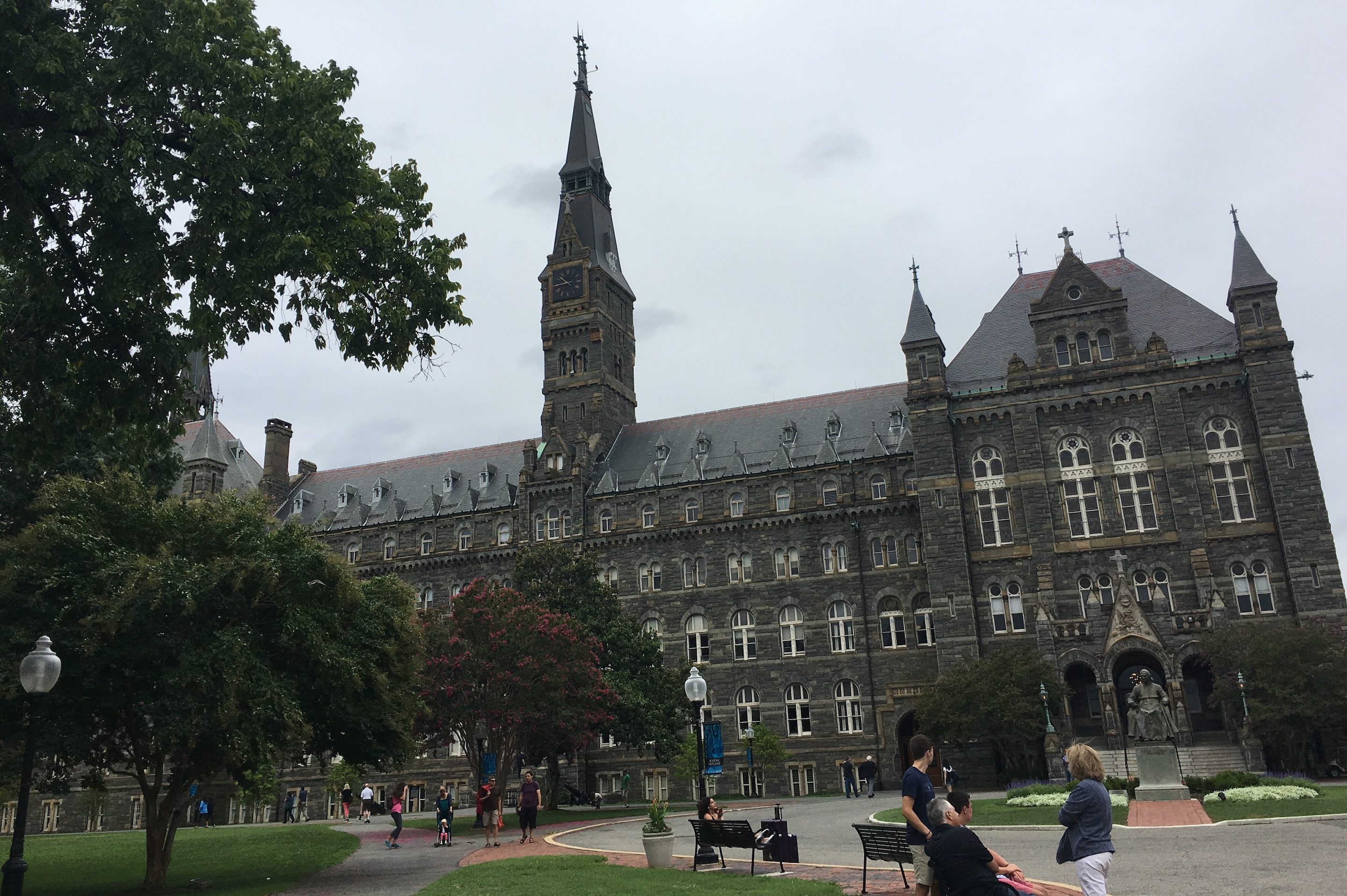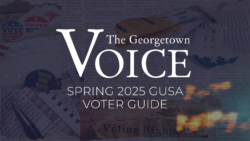Just last week, Georgetown students settled into the likely-difficult semester of online learning ahead. While virtual school is widely acknowledged as a general inconvenience for most students, for students who need additional academic support, this transition poses greater challenges.
During the spring, it became clear that online learning created significant obstacles for specific student communities, and would continue to do so if the university remained online for the Fall 2020 semester. These concerns were especially felt by students concerned with accessibility and accommodations, according to the Georgetown Disability Alliance (GDA).
“When we transitioned into the online environment back in spring, we pretty immediately knew that there was going to be issues,” Dominic DeRamo (COL ’23) said. “We saw that there were professors not upholding accommodations, professors asking students to give up accommodations.”
DeRamo, who serves as GDA’s co-chair of community and is a researcher on the Georgetown University Student Association (GUSA)’s Accessibility Policy Team, has been working on accessibility issues all summer. Students who require additional academic and physical assistance are provided accommodations by the university to ensure equal access to education, ranging from extra time on a test to permission to leave the classroom for medical needs. However, these accommodations are not always upheld, leading to concerns that existed before the university’s move to online instruction last spring. According to DeRamo, the move only made existing problems worse.
“We had issues prior to this, about professors giving students a hard time and asking very invasive questions about why they have an accommodation or what their disability is,” he said. “But when we transitioned to the online environment, all of this was exacerbated.”
The obstacles created by online learning for students requiring academic accommodations and the alleged lack of support from the university has led to increased student advocacy. In the spring and during the summer, the GDA hosted town halls meetings for students to voice their concerns about issues of accessibility and accommodations. According to DeRamo, the meetings helped the GDA understand what kind of problems came up in the spring and what needed to be done for the fall.
“The one thing that was very, very apparent is that a lot of people felt more comfortable coming to us and talking to us and sharing their stories with us than they were with, you know, with just about anyone,” DeRamo said.
“It was really kind of heartbreaking to see that students are helping out other students at this point.”
To help better understand student’s concerns regarding accommodations during an online semester, the GDA released a Feedback on Fall 2020 Accommodation Concerns form, which was publicized by GUSA. The form collected testimonials from students for the GDA to gauge the situation in the spring and inform for the fall.
“It was just supposed to kind of guide GDA and bring up any concerns that we weren’t thinking about because, you know, we’re a board member of six people, we can’t represent every single disability and every single accommodation concern,” DeRamo said.
The results revealed some professors were making things more difficult for students with accommodations. “From the GDA form that we collected,” said DeRamo, “we know that academic accommodations are not being upheld in the classroom.”
With many students citing issues with faculty and accommodations in the spring and no formal process to report them to the university, the GDA was faced with problems that were not guaranteed to be resolved in the fall.
“The concern that both GUSA and GDA are having right now is that these problems are going to continue. The same people are going to be using the same excuses time and time again,” DeRamo said. “And because we aren’t using a formal process to report violations and upholding academic accommodations, these problems are just going to perpetuate throughout the semester and we don’t have any data to actually show us that these issues are happening.”
To combat this issue, GUSA’s Accessibility Policy Team created an accommodation concerns form that was released on Aug. 26. This form allows students to report incidents regarding the behavior of professors and TAs. According to GUSA Accessibility Policy Chair Nesreen Shahrour (NHS ’23), one of the key issues is the lack of accountability for professors.
“There is currently no enforcement mechanism for professors when it comes to academic accommodations,” Shahrour wrote in a statement to the Voice. “Professors are expected to follow the guidelines that the ARC (Academic Resource Center) provides for individual students, but professors often forget that by denying students their accommodations, they are violating both federal law and University policy.”
The form allows students to report professors and TAs for a variety of incidents, including failing to uphold an accommodation, disclosing an accommodation without consent, and asking a student to give up an accommodation. According to Shahrour, the form will be used to collect statistics and track data trends regarding accommodations experiences, something missing from the formal procedures currently put in place for accommodation concerns. With this data, DeRamo hopes that they can attract the attention of the administration and bring them to action.
“We’re really hoping that this can guide our advocacy a little bit. Because I think it’s we spend so much of our time trying to convince the higher up faculty, you know, the vice presidents, the provost office, everyone up at that level, that this is like a very legitimate and widespread concern,” DeRamo said.
While the GDA and GUSA have been working to convince the administration that these problems are widespread, the ARC, which provides academic support for students on campus, has been working to adjust to an online learning environment and assist students in need.
“The Academic Resource Center (ARC) has adapted to a virtual environment since the shift to online learning in March, and we are working extensively with faculty and CNDLS (Center for New Designs in Learning and Scholarship) to ensure both that students can be supported with their accommodations, and that faculty have the resources they need to build those accommodations directly into their classroom environments,”. Joseph Fisher, the executive director of the ARC, wrote in an email to the Voice.
While the ARC has adapted, they had to do so quickly and under intense circumstances. According to DeRamo, the ARC has been left understaffed after the hiring freeze announced by University President John DeGioia left multiple vacant positions. One in eight Georgetown students is registered with the ARC, according to a post on the GDA’s Facebook page.
“The ARC is the one single institution within our university that really has the power to help keep these academic accommodations up and running,” DeRamo said. “We were all thrown into this and we’re trying to figure it out. The ARC had the added struggle of really having to figure out literally hundreds of student’s accommodations overnight.”
DeRamo had nothing but praise for Fisher and his commitment to helping students. “He is leading a resource center that is, understaffed, under-resourced, and put under a ton of pressure, yet he is still just doing everything he can to try to prioritize accommodations,” DeRamo said. “Yet there are just some institutional barriers that are making these pushes for accessibility so incredibly difficult.”
The institutional barriers are ones that DeRamo thinks the Accessibility Policy Team’s work can help ease. The team has worked throughout the summer to address accommodation and accessibility issues and communicate information to the student body. DeRamo hopes that the team can assist the ARC just as it has assisted the students.
“Hopefully moving forward, we can work a little bit on encouraging the university to give more resources to the ARC,” DeRamo said.
To DeRamo, these calls for accommodations and holding faculty accountable get at the core issue of the problem, which is that many professors do not understand the need for accommodations.
“I think, especially a lot of faculty that are failing to uphold accommodations, and the admin that do not think it’s an issue, are of the same mentality and that is that the academic accommodations are something extra, when in reality, they are not. Having additional time on a test is not extra time on a test. It is so the student has equal access to the test,” he said.
According to DeRamo, concerns about accessibility and disability are consistently being forgotten. With the help of advocacy from the GDA and GUSA, accommodation concerns are being brought into the larger conversations about online education and accessibility.
“This isn’t something that’s talked about very frequently. But it is something that is so incredibly important,” DeRamo said.
“We need to be educating each other and ourselves about how we can be making our campus more accessible and more welcoming to students with disabilities.”





[…] News Read More: Accessibility and accommodation concerns rise to the forefront of student […]